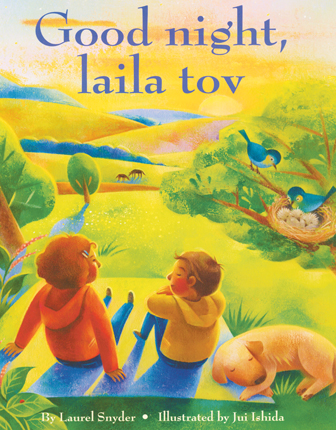| Good night, laila tov Author: Snyder, Laurel | ||
| Price: $6.50 | ||
Summary:
During a family camping trip a brother & sister each night hear the English & Hebrew phrases for good night from the waves, wind, or grass.
| Illustrator: | Ishida, Jui |
| Accelerated Reader Information: Interest Level: LG Reading Level: 1.50 Points: .5 Quiz: 150694 |
Common Core Standards
Grade K → Reading → RL Literature → K.RL Key Ideas & Details
Grade K → Reading → RL Literature → K.RL Craft & Structure
Grade K → Reading → RL Literature → K.RL Integration of Knowledge & Ideas
Grade 1 → Reading → RL Reading Literature → 1.RL Key Ideas & Details
Grade 1 → Reading → RL Reading Literature → 1.RL Craft & Structure
Grade 1 → Reading → RL Reading Literature → 1.RL Range of Reading & Level of Text Complexity
Reviews:
Kirkus Reviews (12/15/11)
Booklist (11/15/11)
The Bulletin of the Center for Children's Books (M) (04/12)
Full Text Reviews:
School Library Journal - 03/01/2012 PreS-Gr 1—A family embarks on a camping trip, traveling by car to a beach, a meadow, and a forest. Each night the children are lulled to sleep by the sounds of the waves, the sky, the rain, and the road, with the repeated English and Hebrew refrain, "Good night, laila tov…." But, when they return home, it is their parents who fall asleep exhausted on the couch. The text is lyrical and poetic, and the bright illustrations blend realism with whimsy, brilliantly depicting the beauty and serenity that the children discover in nature. Despite the small hints at the family's Jewish heritage-a Star of David necklace, a tzedakah (charity) box, a menorah—the inclusion of the Hebrew phrase is irrelevant. It could have just as easily been in any other language or left out entirely. With lighthearted elements of humor ("We stopped for dinner, stopped to see…Stopped again so I could pee"), the book takes readers on an inspiring, well-written, rhyming journey.—Rachel Kamin, North Suburban Synagogue Beth El, Highland Park, IL - Copyright 2012 Publishers Weekly, Library Journal and/or School Library Journal used with permission.
Bulletin for the Center... - 04/01/2012 In this rhyming story, a family camping trip provides the impetus for a brother and sister exploring the natural world. The family first stops at the ocean, where kids play in the waves and camp on the sandy beach, then continues to a grassy hillside, where the kids gather berries by day and get caught in the rain by night. Exhausted from all their adventuring, the children periodically collapse and sleep to the repeated refrain, in mixed English and Hebrew, of “Good night, laila tov.” Unfortunately, only the jacket flap makes clear that the activity is part of the tradition of tikkun olam (repairing the world), and there’s no explanation that “laila tov” means “good night.” The rhyming verse is bland and jingly (“We stopped for dinner, stopped to see . . . /Stopped again so I could pee”), and the family’s apparent habit of planting seedlings near their campsites is actually more ecological threat than reparation. Ishida’s scenes are chock full of activity, but the colors tip into the lurid, and the draftsmanship is stiff and uninviting. Tikkun olam is a compelling tradition, but this simply doesn’t effectively introduce it to young people or offer a compensatory story; turn instead to Schwartz’s folkloric Gathering Sparks for an accessible examination of the concept. HM - Copyright 2012 The Board of Trustees of the University of Illinois.



